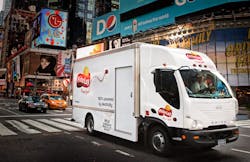CEO charged about Smith Electric's future
In a recent Dept. of Energy filing, Smith Electric Vehicles said that is has stopped shipping trucks and step vans with its Generation II system to customers “due to the company’s tight cash flow situation.” The company confirmed that it has halted production at its Kansas City facility as part of a “planned and temporary shutdown” with hopes that production will resume in 2-3 months time.
But that is really only part of the story, co-founder and CEO Bryan Hansel told Fleet Owner. In an exclusive interview about the future path of the company, Hansel said the shutdown is only temporary and “we’re just about ready to announce” major funding which will allow it to produce its Generation III vehicle at a lower cost.
“I’ve never felt better about our future than I do now,” Hansel said. “When we turn our factory back on, we will have a truck that is probably 30% cheaper to build.”
Hansel said the company is still supporting all current customers, who have been notified of the situation, and stopping production in the fourth quarter of 2013 was the responsible path to take. It was all about utilizing available capital, he said, noting that the company had a choice to continue towards its path of launching the next-generation vehicle, although it ran the risk of not being able to support existing customers, or stopping production until new financing was lined in order to direct resources to existing current customers.
“We had to be responsible and utilize our capital correctly,” he said.
Smith reports that it has approximately 800 of its all-electric vehicles in real-world operation today that have traversed more than 8 ½ million miles.
The low cost of electricity and zero emissions profile of all-electric vehicles has pushed many fleets, mostly those operating in urban environments, into the electric space with at least some part of their fleet. Smith Electric, a start-up that began making all-electric medium-duty trucks in 2009, has been poised to garner much of that market with few, if any, significant competitors. Frito-Lay, Coca-Cola Refreshments, DHL, Staples and TNT Express are among the companies that have invested in Smith vehicles.
The DOE filing, part of a requirement for the private, Kansas City, MO-based company as a condition of receiving a $32 million grant in 2010 to fund the manufacturing, placement in fleet operations, and data gathering of 510 electric vehicles based on the Newton medium-duty platform, also noted the Generation II system was developed as a result of performance data collected through the demonstration project. Despite the halt in delivery of new vehicles, Smith’s filing said the “telemetry system continue(s) to provide actual live data extraction of Smith vehicles already in service, consolidated and delivered to the NREL (National Renewable Energy Laboratory) , as prescribed in the DOE/ARRA Award, for the months of September, October and November 2013. December 2013 data was submitted in early January 2014. Submissions of data are successfully occurring monthly for all in-service vehicles.”
According to Namrata Kolachalam, a spokesperson with the Dept. of Energy, the shutdown does not significantly impact the grant funding. The grant, she told Fleet Owner, is used to reimburse Smith for costs incurred during the design and data collection period specified in the grant.
The grant was awarded in April 2010 and 86% of the vehicles have been delivered to date, Hansel said, with about 95% of the grant funding already paid to Smith Electric, Kolachalam noted. Hansel said Smith will complete the requirements of the grant with the delivery of Generation III vehicles.
As with any startup, Smith has traveled down a winding path. In 2012, the company filed for an initial public offering (IPO) of stock, but withdrew that on Sept. 20, 2012.
“The strategy behind our launching an IPO revolved around knowing the confidence of our client base of large fleets would be higher if we were publicly traded and they could thus access our public information,” Hansel told Fleet Owner at the time. “With $50 million in revenue last year, we thought the market would give is the valuation we thought we deserved [to make an IPO successful]. But in talks with financing groups, the ultimate response we received was that we were not yet big enough or profitable enough at this time to make a public offering [and we should] come back when we are more appropriately sized for the public market.”
Yesterday, Hansel said the lesson from that experience was to “come back when you have a truck that is [making a profit].” At the time, he related, the company was selling the trucks for approximately the cost it was taking to produce them and investors were not thrilled with that scenario.
“We’ve learned a lot and that knowledge has allowed us to [develop] the product,” he said. The new financing expected to be announced in the coming weeks allows the company to build the trucks at scale, reduce the cost to manufacture them, and provide everyone – Smith and its customers – with a truck that will make money.
Smith initially launched in the U.S. as Smith Electric Vehicles US Corp. and began producing trucks in 2009. Its initial truck design was drawn from Smith Electric Vehicles (U.K.), which was founded back in 1920. In January 2011, the U.S. Smith company acquired the British firm and formed what is now Smith Electric Vehicles Corp.
